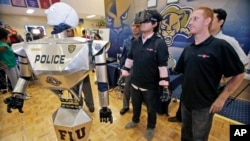Robots can flip burgers, build cars and greet clients at a reception desk. And, as more and more robots take over jobs that used to be performed by people, human workers are becoming justifiably anxious.
In fact, almost half of U.S. jobs are likely to be automated within the next two decades, according to researchers at England's Oxford University, and it's a trend that's here to stay.
“What we've seen in the U.S. and maybe some of the more western industrialized countries over the last 25 years," said Boston-based business expert Nigel Dessau, "is the removal of entry-level jobs and the removal of the simple, repetitive manufacturing jobs."
He pointed to a line in a Sylvester Stallone movie set in the future.
"A character calls the police station and the person says ‘if you'd like to speak to a robot please press ‘one’ now. If you're OK still speaking to a person, stay on the line.’ And it’s sort of the way we're heading," Dessau said.
The three-step approach
But he contends that robots are not taking over, and success in the new world of work is possible for mere humans.
The founder of a job mentoring website, Dessau says there are ways workers - especially the millennial generation that is now in their 20s and 30s - can adapt to this new reality, starting by making themselves "stand out."
“The jobs that can be easily automated are easily replaced. When looking to build a career in this century, you have to think more about other sets of skills that you need to get," he said, listing the three skill sets he focuses on.
- Content: “So that’s, what do you know? What do you bring that a machine doesn't know?"
- Approach: "How do you get to work with other people? How can you lead a team?"
- Network: “Who knows what you know, and what you can do?"
"So focus less on the processes because those are what gets automated. Focus more on the content and the ability to work as a team," Dessau emphasized. "That’s what will differentiate you - and protect you - from being replaced by a robot.”
Robots vs humans
The businesses that are most vulnerable to automation, according to Dessau, are the fast food industry and other labor-intensive businesses such as manufacturing.
But even those industries still need people, he insists, because being able to talk with and lead people from different backgrounds, cultures, and countries is a crucial skill in this global business environment, and something a robot cannot accomplish.
“Those restaurants where they're putting in fast food automated systems still need managers and they still need leaders and they need people to talk to customers. And those are the skills that people need to acquire."
A greater purpose
In addition, Dessau said, millennials tend to have a particular mindset - which also sets them apart.
“When you talk to that generation [and] you say ‘what do you want for a job?,' what you see them talking about is they want jobs that they can be passionate about; jobs that fulfill some greater purpose,” he said.
Automation will help them do that, he predicted, "give us the ability to do better things with our lives; less boring, less redundant things and work on more meaningful things where we can help each other and help the community.”
His biggest piece of advice for millennials -- and anyone else entering the 21st century workplace?
"Don't delegate the responsibility for your success to something or somebody else. At the end of the day, it is your career. It is your life. And you must make the decisions to make your life successful and you can't blame robots and you can't blame automation."






